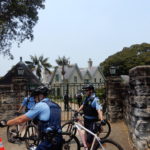11-Year-Old Charged with Murder in WA

An 11-year-old boy appeared in Perth Children’s Court last week facing a charge of murder. The desperately sad and shocking story of the boy’s life gives some insight into how he ended up one of the youngest children in Australia ever to be charged with murder.
As the boy prepares to face charges that will determine the course of his young life, experts are concerned that Australia’s laws regarding the age of criminal responsibility are too low and out of step with international norms.
One of Australia’s youngest defendants in a murder trial
The 11-year-old, who cannot be named for legal reasons, was arrested, along with two 19-year-old men and a 29-year-old man after 26-year-old Patrick “Paddy” Slater was stabbed to death during a brawl outside Perth’s Esplanade railway station in the early hours of January 27 this year.
The victim’s younger sister, Denise, told reporters she was injured when a fight involving about 20 or 30 people approached the spot where she and her brother were waiting outside the train station.
She reported that Mr Slater picked her up and and carried her to some nearby bushes where she could hide while he tried to divert attention away from her. Denise said she saw her brother stabbed from her hiding place.
Mr Slater later died in hospital from his injuries. His family and friends describe him as a “gentle giant”, and could not understand how such a tragic incident could have occurred.
The boy has been held on remand at Banksia Hill Detention Centre since his arrest. A family friend who visited him told The Sunday Times:
“I’ve known him from a very little boy. His whole demeanour, his face has swelled up to the max from the constant weeping, crying,”
“He looks a lot older than 11 at the moment…this boy is soaked with pain, with agony,” she said.
Calls for the age of criminal responsibility to be raised
Amnesty International Australia has written to the Attorney-General expressing concern that:
“The current minimum age of criminal responsibility in Australia is out of step with international law, and with evidence about children’s brain development that clearly demonstrates that children under 12 years lack the necessary capacities for full criminal responsibility – and many do not gain these capacities until 15.”
Amnesty urges law reform to uphold the rights of children by increasing the age of criminal responsibility, in line with other countries around the world.
Looking at global examples, the age of criminal responsibility is generally higher in other developed countries:
- 12 years—Canada, Greece, Netherlands;
- 13 years—France, Israel, New Zealand (except for murder/ manslaughter where the age limit of 10 applies);
- 14 years—Austria, Germany, Italy and many Eastern European countries;
- 15 years—Denmark, Finland, Iceland, Norway, Sweden;
- 16 years—Japan, Portugal, Spain;
- 18 years—Belgium, Luxembourg.
Our international obligations concerning rights of the child
The minimum age of criminal responsibility is 10 years old throughout Australia.
Our obligations under the United Nations Convention on the Rights of the Child (UNCROC) dictate that Australia sets “a minimum age below which children shall be presumed not to have the capacity to infringe the penal law.”
Although the UNCROC does not specify an ideal minimum age for criminal responsibility, the UN has criticised countries who have set the age below 12 years. It has officially stated that:
“The minimum age of criminal responsibility differs widely owing to history and culture. The modern approach would be to consider whether a child can live up to the moral and psychological components of criminal responsibility; that is, whether a child, by virtue of her or his individual discernment and understanding, can be held responsible for essentially antisocial behaviour. If the age of criminal responsibility is fixed too low or if there is no age limit at all, the notion of responsibility would become meaningless.”
In New South Wales, section 5 of the Children (Criminal Proceedings) Act 1987 sets the age of criminal responsibility at 10 years. However, the common law presumption of doli incapax operates for child defendants under 14 years. This means the prosecution is required to prove the child had the capacity to understand their actions were wrong.
Australian courts have recognised that the evidence showing a child had sufficient appreciation of the wrongness of an act must be “strong and clear beyond all doubt and contradiction” and must not consist merely of evidence of the acts amounting to the offence itself. The evidence must also show the child knew the act was “seriously wrong, as opposed to something merely naughty or mischievous”.
The NSW judiciary has previously proposed that the age for the presumption of doli incapax should be lowered to 12 years, in line with the transition to high school. Former Senior Children’s Court Magistrate of New South Wales, Stephen Scarlett, said:
“It would seem obvious that children in the final stages of the 20th century are better educated and more sophisticated than their counterparts 200 years ago…A child of 12 in Australia has access to television, radio and the Internet, and has a far greater understanding of the world than a 12-year-old in rural Britain in 1769.”
Still a gap for Indigenous children
In the recent case of the 11-year-old boy, both he and the victim are Aboriginal. Nyoongar elder, Ben Naylor, told NITV News that a loss of culture has destroyed Indigenous communities and that drugs and alcohol are a problem, even for children.
“Our culture has been destroyed by colonisation and the stolen generation,” he said.
“There are scars, they’re scars of the White Australia policy, of being torn from your mother’s arms.”
The Australian reported that the boy has had a troubled history with authorities, was not enrolled in school at the time of his arrest and was living with his grandmother while his father was in prison.
While a presumption of doli incapax will apply due to the boy’s young age, it is also important to consider the health, education, and social justice issues faced by many Aboriginal children; while, at the same time, recognising the serious nature of the alleged offence and enormous impact upon the victim’s family.






